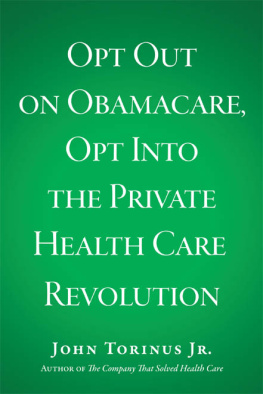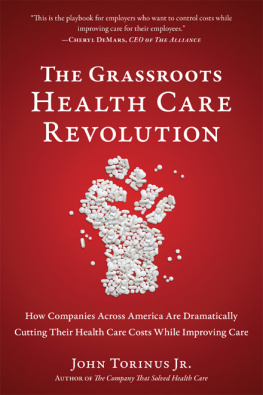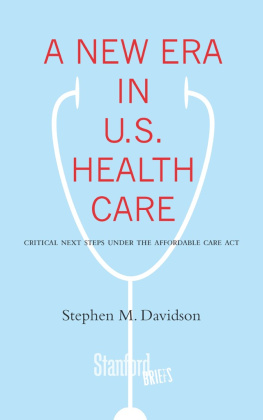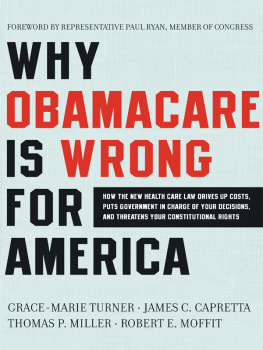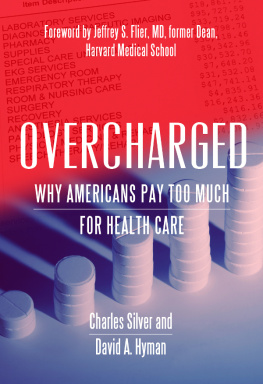Opt Out on Obamacare,
Opt Into
the Private Health Care
Revolution
John Torinus Jr.

BenBella Books
Dallas, TX
Copyright 2013 John Torinus Jr.
All rights reserved. No part of this book may be used or reproduced in any manner whatsoever without written permission except in the case of brief quotations embodied in critical articles or reviews.

BenBella Books, Inc.
10300 N. Central Expressway
Suite #530
Dallas, TX 75231
www.benbellabooks.com
Send feedback to
First e-book edition: June 2013
ISBN 978-1-939529-86-2
Copyediting by Chris Gage
Distributed by Perseus Distribution
perseusdistribution.com
To place orders through Perseus Distribution:
Tel: 800-343-4499
Fax: 800-351-5073
E-mail:
Significant discounts for bulk sales are available. Please contact Glenn Yeffeth at or 214-750-3628.
CONTENTS
Chief executive officers (CEOs) across America, with a few exceptions, should offer a class action apology for allowing the economics of health care to get totally out of whack.
By any financial measure, the existing business model for health care in the United States is busted, and the people in the corporate offices let it happen. They are paid lots of money to fix major problems facing their companies and the economy, and only a few have raised health care to the level of a strategic priority.
They didnt apply the golden rulehe who has the gold rules. They are the payers for about half of the national health care bill, and they didnt rule. Specifically:
They didnt create a marketplace to bring supply-and-demand disciplines to the delivery of care.
They didnt engage their employees as active managers and consumers of medical treatments.
They didnt create a culture of health in their organizations.
They allowed providers of care to vertically integrate the health care supply chain to the great disadvantage of employers and their employees.
They didnt deploy the management expertise of their teams to build a better business model for health care.
Fortunately, there needs to be an amendment to the CEO apologia. A growing cadre of innovative CEOs has taken measure of the magnitude of the challenge, and they have leaped into action. Their collective efforts have given birth to a disruptive new business model that works.
They are CEOs or former CEOs like Paul Purcell of Robert W. Baird & Co.; Jim Hagedorn of ScottsMiracle-Gro; Steve Burd of Safeway; Tim Sullivan, formerly of Bucyrus International; and Bill Linton of Promega.
Before we dive into the new model, let us count the ways that the current model is broken:
Costs have roughly doubled every eight years for the last four decades. At this rate, health benefits could equal base pay for many jobs within a decade. Some manufacturers report that the cost of insuring their workers exceeds that of production materials.
Costs per employee already average more than $15,000 in the United States, and many exceed $20,000.
Prices for procedures vary wildlyas much as 300 to 400 percent within regions, even from hospital to hospital and clinic to clinic within the same health system.
More than 40 percent of US companies dont offer health care insurance. Their prime reason: the punishing costs.
Medical bills are now the leading cause of personal bankruptcy in the United States.
The US government is running trillion-dollar annual deficits, and health care entitlements are a major cause of the red ink. Major national priorities like education and environmental advances are being crowded out. A recent defense secretary said the Pentagon spends more on health care than on weapons.
Many state budgets hemorrhage red ink because of undermanaged health costs, especially in Medicaid.
Some municipalities have gone bankrupt, citing public employee health costs as a major contributor to their insolvency.
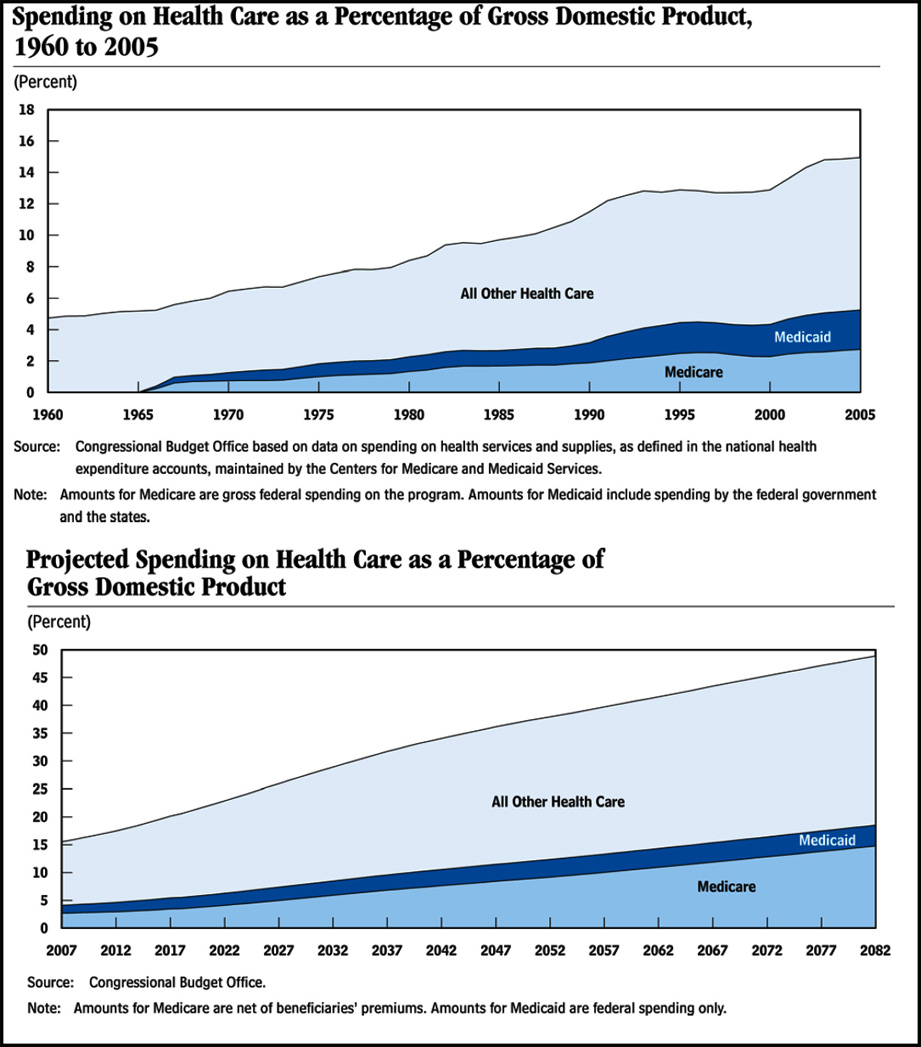
This catalog of negative consequences is an indictment of the existing business model for medicine, even as doctors and their teams deliver minor miracles on a daily basis on the treatment side. US physicians and nurses are at the cutting edge when people get sick. Almost all the practitioners deliver empathetic, professional, and caring service.
But fixing sick people isnt good enough if it bankrupts them, their companies, and their government in the process. The economic side of medicine has to be as effective as the medical side.
The Hippocratic Oath for physiciansFirst, do no harmhas to be extended beyond medical outcomes to the economics of care.
Unrelenting health care inflation has generated extreme frustration at private companies. Unlike public sector business managers, they cannot transfer cost hikes to taxpayers. Their customers wont allow them to pass along any excess costs. With nowhere to turn for relief, private sector payers are revolting.
In short, cost management has been the missing link in US health care. Management has to be brought to bear.
Put on another hat. Think what a turnaround manager would do if confronted with a totally busted business model, one that has been going the wrong way for decades? The turnaround guru would look at the existing playersinsurance companies, provider organizations, policy wonks, and political experts in health careand that manager would be highly skeptical of their ability to turn things around. That manager would conclude that the major players in health care have been talking reform for decades but have demonstrated little success. Our expert would be looking for a clean sheet of paper. She would look for a new business model.
Some hospital initiatives have slowed the cost escalation, especially among providers that have employed the lean disciplines that were introduced into manufacturing with great success forty years ago. But only a small minority of providers, like the Cleveland Clinic and ThedaCare in Wisconsin, has adopted transformational lean methods.
Health care corporations, whether for-profit or not-for-profit, and health insurance companies are huge organizations that have profited handsomely in the current dysfunctional environment. They face neither market disciplines nor regulatory price controls. They commonly see limited competition. This means there is little incentive to cut costs. They are almost immoveable objects. Why should they move? Life, for them, is good.
It is also good for health insurers.
Since the main assets of health insurance companies are their networks of providers and the volume discounts they generate, its unrealistic to expect them to be agents for reform. Why would they push their providers hard when they need them and when they get a cut out of rising costs? Indeed, they have a huge disincentive to drive down overall costs, since doing so would reduce their revenue increases.
The new Affordable Care Act (ACA) may expand health care coverage to 94 percent of Americans, but it makes the cost outlook worse. Under medical loss ratio rules, health insurers may keep for themselves no more than 15 percent of large-company plan premiums and no more than 20 percent of small-company premiums. This gives them every reason to want the other 85 percent or 80 percentthe amount theyre obliged to spend on medical care and quality improvementto be as high as possible so their 15 to 20 percent cut is protected.

